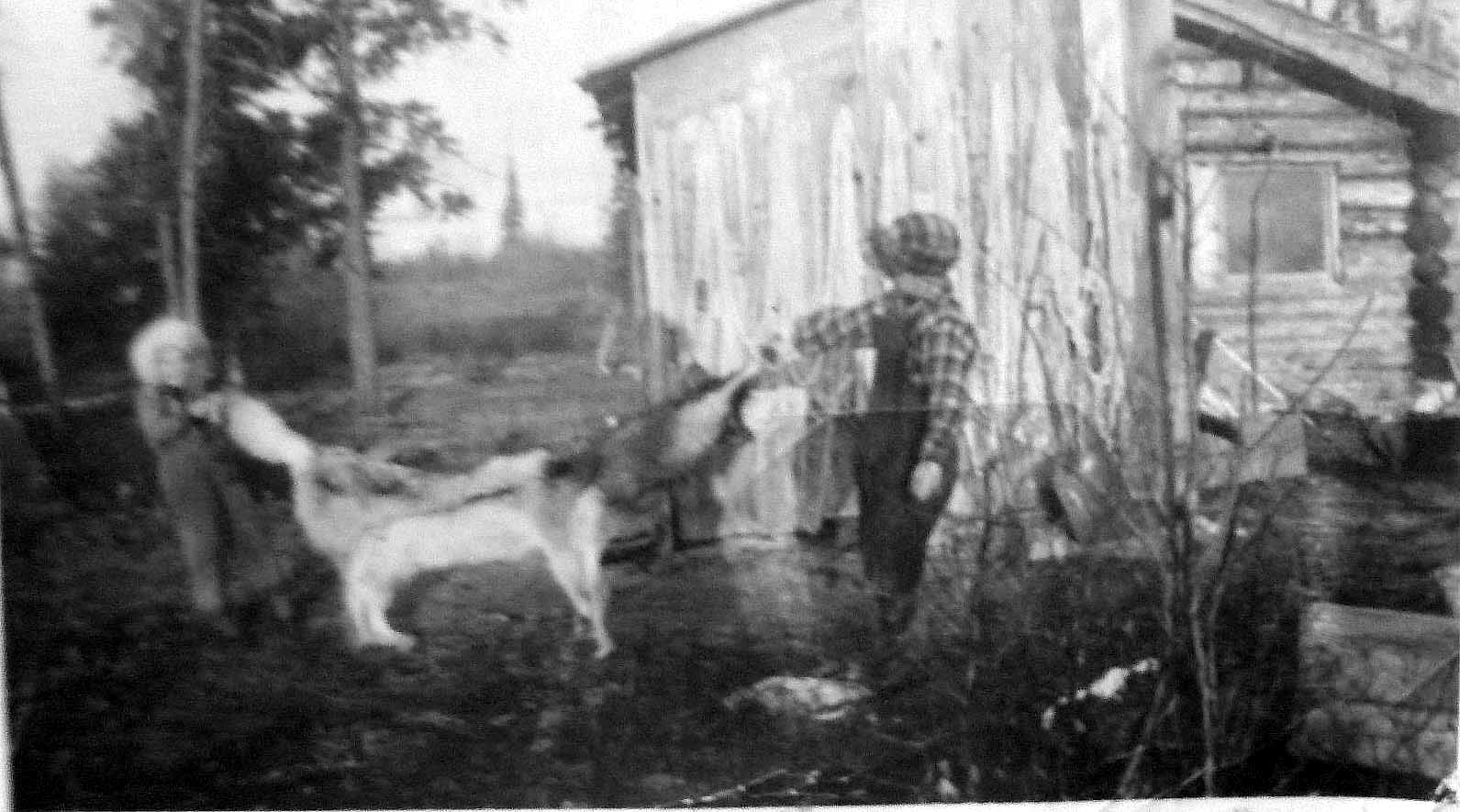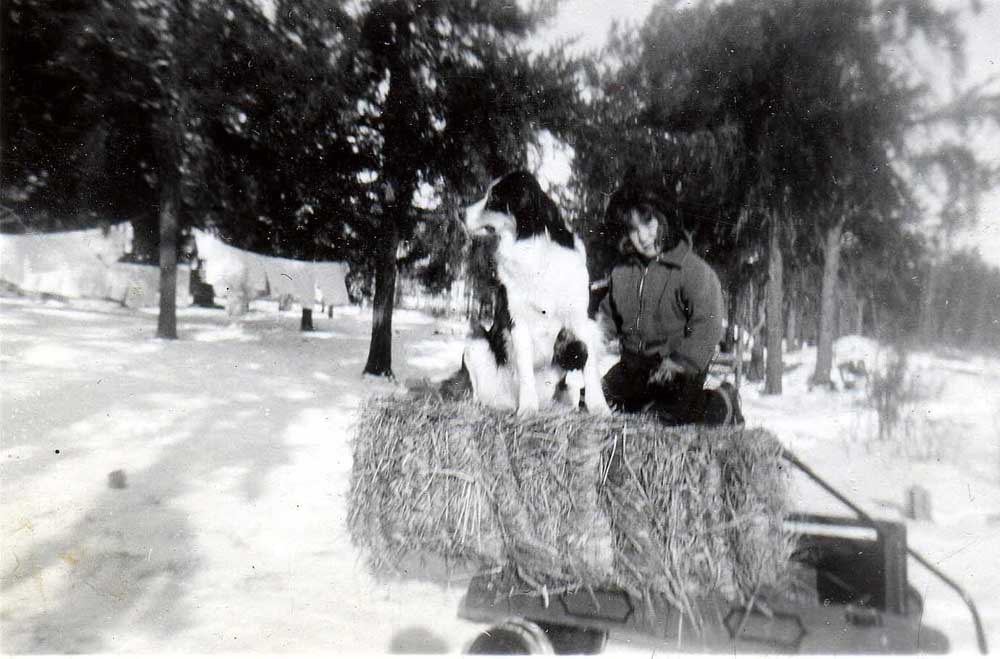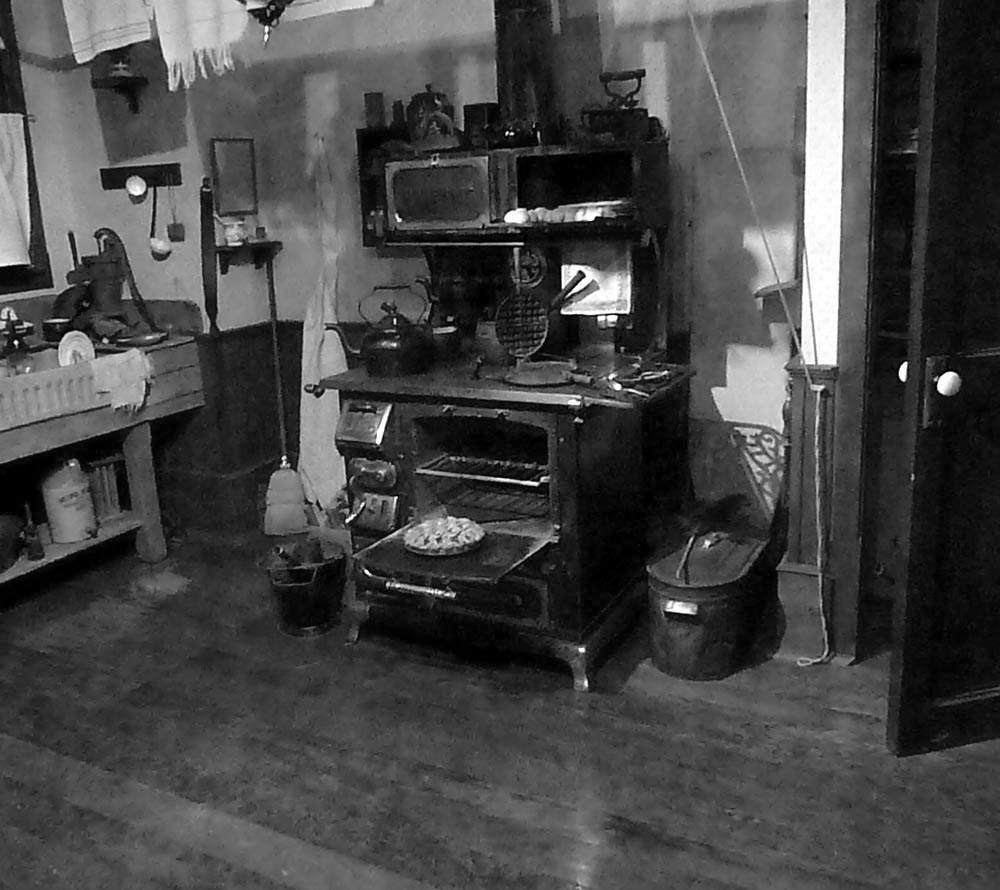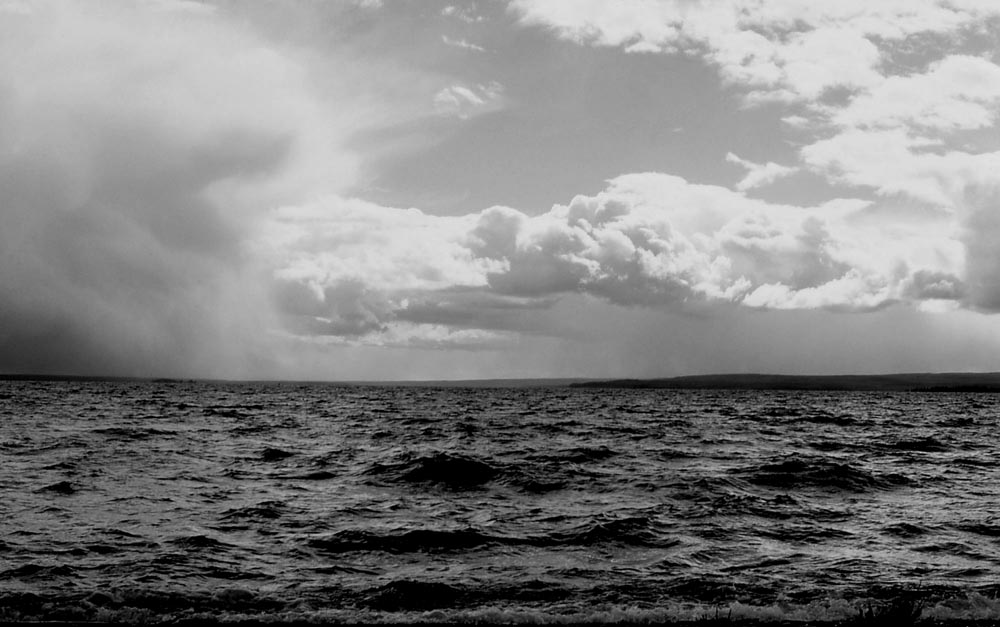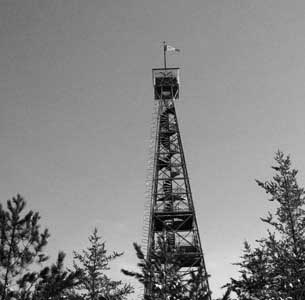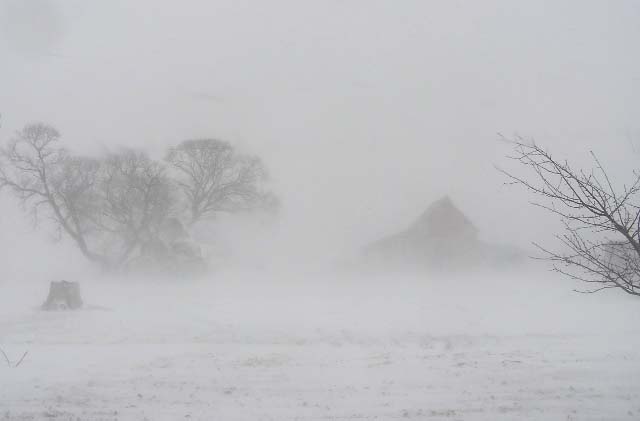Posts Tagged ‘Harold McNeill’
Marie Lake: The Trapline – Chapter 5 of 11
Louise (4) and Harold (7) hold a large Silver Wolf that Mr. Goodrich (photo below) had shot earlier that fall. Wolf packs were very common in the area, but they seldom bothered any of the area residents as wild game was plentiful (Photo by Mom).
May 8, 2014. This story is brought forward as it is the 7th birthday of our Grandson, Grayson Edward Walker.
Grayson, check out one of the things Grandpa was doing during his 7th year.
Link to Next Post: Link to My Best Friend
Link to Last Post: Link to Explosion
Link to Family Stories Index
Winter of 1948 – 1949
Suddenly Shep stopped dead in his tracks and stood perfectly still. The hair on his neck and back bristled as a soft, low growl emanated from deep within his throat. I scanned the bush – nothing. He continued to growl and slowly sniffed the air off to my right.
Suddenly I caught a wisp of two large silver-grey animals moving furtively through the trees about 100 feet off the trail. Wolves! No doubt the rest of the pack would be nearby.
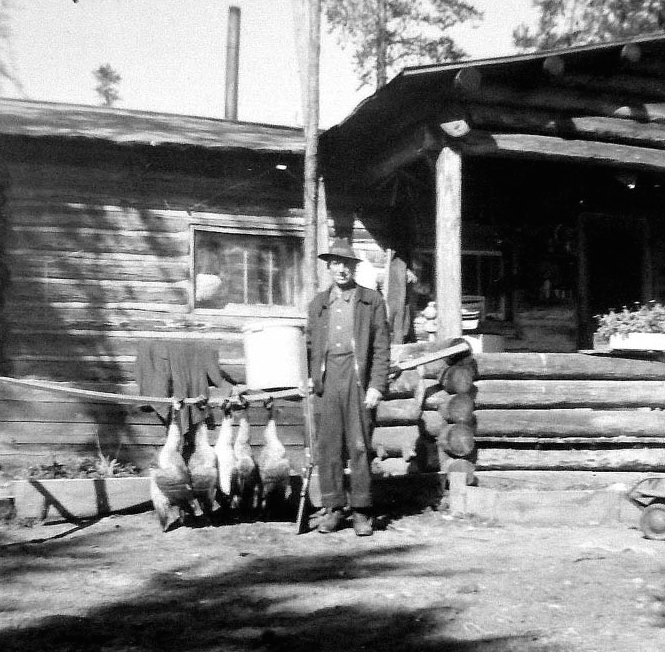 Everything Mr. Goodrich had told me about encountering a wolf or other predator flooded into my mind.
Everything Mr. Goodrich had told me about encountering a wolf or other predator flooded into my mind.
“Just keep walking and go about your business! Don’t run. Stand tall. Keep chatting – make some noise – fire a shot at a tree if you wish. The wolves have been well feed this winter so they are more afraid of you than you of them. Remember, a healthy, well fed wolf or bear will seldom attack a human.
‘Seldom attack?’ ‘Well fed?’ I certainly hoped so. At under four feet, even ‘standing tall’; I was not going to make much of an impression. As for the part ‘they are more afraid of you than you of them!’ there is no way on God’s green earth, one of those big, silver-grey wolves could possibly be more afraid of me. It probably didn’t help that mom had been reading all those ‘big bad wolf stories’ when I was a little boy.
Photo: (by mom): I do not have any photos of Mr. Goodrich hunting big animals, but in this photo he stands holding his shotgun in front of our house. Beside him is several geese he had shot early one fall morning in 1948.
As for wolves, just the previous week Mr. Goodrich had killed a large male not many miles from my present location. He also told us he had observed a kill site further north where the wolves had taken down a deer. Louise and I had held the skin of that large male and had to pull hard just to keep it to off the ground. It must have stretched six or seven feet from the tip of the nose to the end of the tail.
(2939)
Marie Lake: My Best Friend – Chapter 6 of 11
Photo (by Mom): While was a good friend with who I spent considerable time exploring the wilderness around our home, by best friend was my little sister Louise. Together we spend hours building things, helping around the house and taking school lessons from mom.
Link to Next Post: Link to Crash on Highway 28
Link to Last Post: Link to The Trap Line
Link to Family Stories Index
1947 -1949
Life can be fragile, a fact our family had plenty of chances to learn – Louise nearly drying from a killer fungus, then, nearly drowning and mom’s injury from the explosion.
The coming summer, to be our last at Marie Lake, would find dad left for dead in the Cold Lake Hospital. That fall, Uncle Warren and Cousin Emerson would stare down the grim reaper on the thin ice of Marie Lake, the lake that had nearly taken Dad, Aunt Marcia, Louise and me to the bottom.
It was a time when Louise and I would be drawn more closely together than at any time in our lives, before or after. While our dog Shep played a prominent role in my young life, I would have to say that Louise grew to be my very best friend over the two short years at Marie Lake. We played, worked, studied and planned new adventures and, Shep was close by our side. It was an all too brief interlude in our lives, a time when life stood still.
(1491)
Marie Lake: Explosion – Chapter 3 of 11
Photo (Web). A wood cookstove that nearly ended our mothers life.
Link to Next Post: Link to Easy Come, Easy Go
Link to Last Post: Link to Growing Up in the Wilderness
Link to Family Stories Index
July, 1947
It was one of those quiet, lazy July mornings at Marie Lake. The dead calm waters reflected the morning sun and the leaves on the poplar trees, usually twisting and fluttering in the slightest breeze, hung as if frozen in time. The only noise to be heard was the quiet chatter of a few birds and of the laughter of Louise and me as we 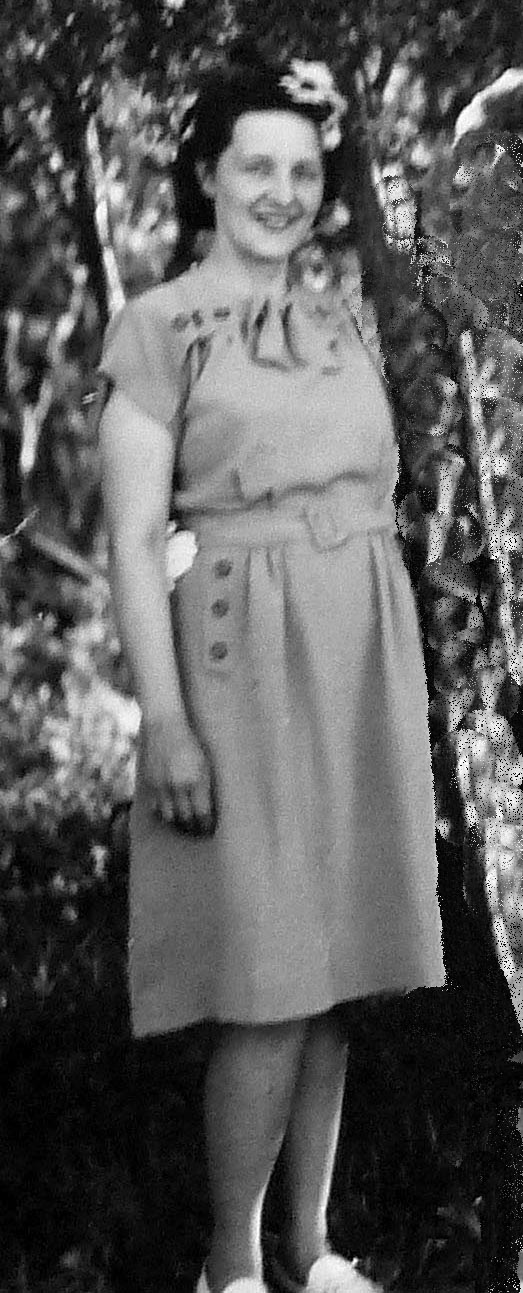 dredged out wet sand to complete our giant sand castle – to be a surprise for mom and dad.
dredged out wet sand to complete our giant sand castle – to be a surprise for mom and dad.
Suddenly, the serenity of the morning was bluntly ended by a loud, deep ‘whooomp’ coming from the direction of the house. A split second later the silence was further pierced by a blood curdling scream that echoed through the trees and down to the water. Louise and I sat there, momentarily frozen.
With the screams rising in intensity, we jumped up and run towards the house. As we topped the small sand bank we saw mom running with flames and smoke rising from her body. We were stricken with fear at a site we couldn’t fully comprehend.
After a short distance, she fell and rolled in the sand, grass and pine needles covering the yard. We stopped dead in our tracks not knowing what to do. At that moment dad came running from the mink pens. He frantically tried to smother the flames with his jacket but it wasn’t large enough to cover her whole body. Each time he moved the jacket, flames would spring to life. An eternity passed before the flames were finally extinguished. The nauseating smell of burnt cloth, plastic and flesh permeated the air.
Dad hollered: “Harold, Louise, get a sheet off the bed.”
(1757)
Marie Lake: The Mink Pen Adventure – Chapter 1 of 11
A line squall moves toward our boat as we crossed Marie Lake. The high winds and waves placed us in mortal danger.
Link to Next Post: Link to Growing Up in the Wilderness
Link to Last Post: Link to Near Death on the Dock (End of Part II)
Link to Family Stories Index
1947 -1949
Marie Lake was suddenly rough, very rough, as the wind stirred up white frothy waves to a height of three or four feet. The ice had been out for no more than a week and small chunks could still be seen floating nearby. We were being drenched by the freezing spray and at this moment were in imminent danger of being thrown into the freezing cold, dark waters.
Aunt Marcia1 reflected upon that hair raising boat trip:
“That crazy uncle of mine was so smart but he had no sense when it came to being cautious. When we left the dock he could see storm clouds on the horizon and the wind was rising. I was only fifteen but even I knew Marie Lake could quickly become rough enough to swamp our small boat.
Now, here we were, spread-eagled on top of a boat covered with stupid mink pens. Mink pens, can you believe it – stinking, dirty mink pens. I suppose we were lucky Uncle Dave had not kept the mink in them. I asked him to wait, but he laughingly chided me – come along or stay by myself. Stupid me, I went along. Now we were in the middle of the lake and things were going from bad to worse.”
(1661)
Birch Lake -The Fire Tower: Chapter 4 of 4
Photo (Web) Fire towers in the early years were flimsy wooden affairs. Over the summer of 1944, dad took a job with the Saskatchewan Forest Service as an observer at one of the hundreds of fire towers that had been erected throughout Northern Saskatchewan, this one above is similar to the one dad worked near Meadow Lake. After that one summer, we often returned to Meadow Lake for the yearly Stampede.
Link to Next Post: Martineau River Logging Camp (Beginning of Part II)
Link to Last Post: A Place in the Sun
Link to Family Stories Index
Spring, 1944
Mom repeatedly called: “Hoo hoo, Harold, where are you? Hoo hoo, Haarooold.” There was no answer and she was more than worried. At three and a half, I was always running around outside playing, but when mom hadn’t heard me for a while she went out to see what I was doing. She knew that dad was in the bush cutting wood and sometimes he would take me along, but would always tell mom first. She probably thought I was into some kind of mischief that would not be far off the mark for a three-year-old.
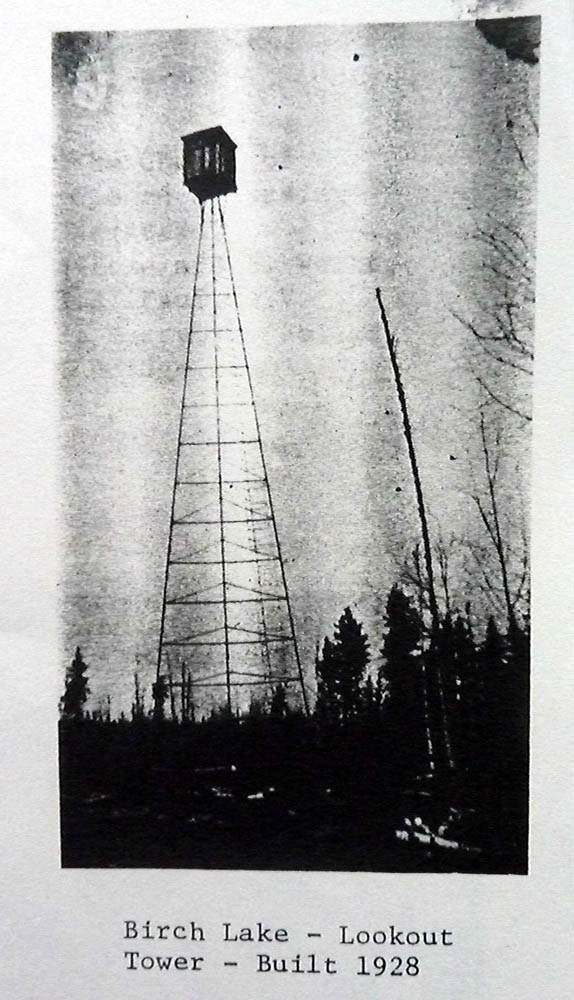 Mothers! So trusting of their little boys!
Mothers! So trusting of their little boys!
Photo: This photocopied from a Cater and District “Least we Forget” series of stories found in my mother’s files. The tower at Meadow Lake was very similar to the Birch Lake Tower (L). The ladder to the top can just be discerned on the right side. It is hard to believe this structure was capable of holding the small lookout shelter built on the top, to say nothing of when a line squall with gale force winds passed through the area.
In one of our conversations, Mom recalled that summer day in the wilderness north of Meadow Lake:
“Louise was sleeping and when I couldn’t find you after a few minutes, I became worried. I called and called but you didn’t answer. Finally, I could hear this faint little voice: “…..here mom..!” It was so faint I could not figure out where on earth you were. I walked further back along the path that led to the fire tower and continued to call. Your answers came back a little louder, but still distant …. ‘up here mom….’.
When I neared the clearing by the fire tower I looked up and there you were about 50 or 60 feet off the ground on the open ladder. I was petrified. In the few months, we had been at the Ranger Station, I had never climbed that open ladder to the top. I tried a couple of times with Dave, but only got up about 15 feet before I had to come back down.
Over my objections, your Dad had taken you to the top several times. You would climb the ladder ahead of him and between his arms. I could never watch as I was petrified. I told him to even tell me when he was taking you up otherwise I would be worried sick. Even at the top, there was no railing that would stop a three-year-old from falling over the edge.
(1763)
Birch Lake – The Blizzard of ’41 – Chapter 1
Photo (Saskatchewan Farm Life): In the early years of living on the farm in Saskatchewan, winter blizzards could arrive suddenly and last for days. Travelling in such such conditions could be a dangerous affair.
Link to Next Post: A New Beginning
Back to Main Index
Deep Winter, 1941: A Baby is Born
Just after ten in the morning, the pain struck, causing the expectant mother to double over. She grabbed the kitchen table to keep from falling, and as the pain eased, she lowered herself into an easy chair near the log fire. Home alone, two miles from the nearest neighbour, ten from the village of Glaslyn, and forty-five from the hospital in Edam, she was frightened. With no idea what time her husband might return, she considered walking to the nearest neighbour, something she did many times. But now, amid this January blizzard, with its bone-chilling cold, and drifting snow, that was out of the question.
The David and Laura McNeill Farm near Birch Lake, Saskatchewan
where the couple began their married life.
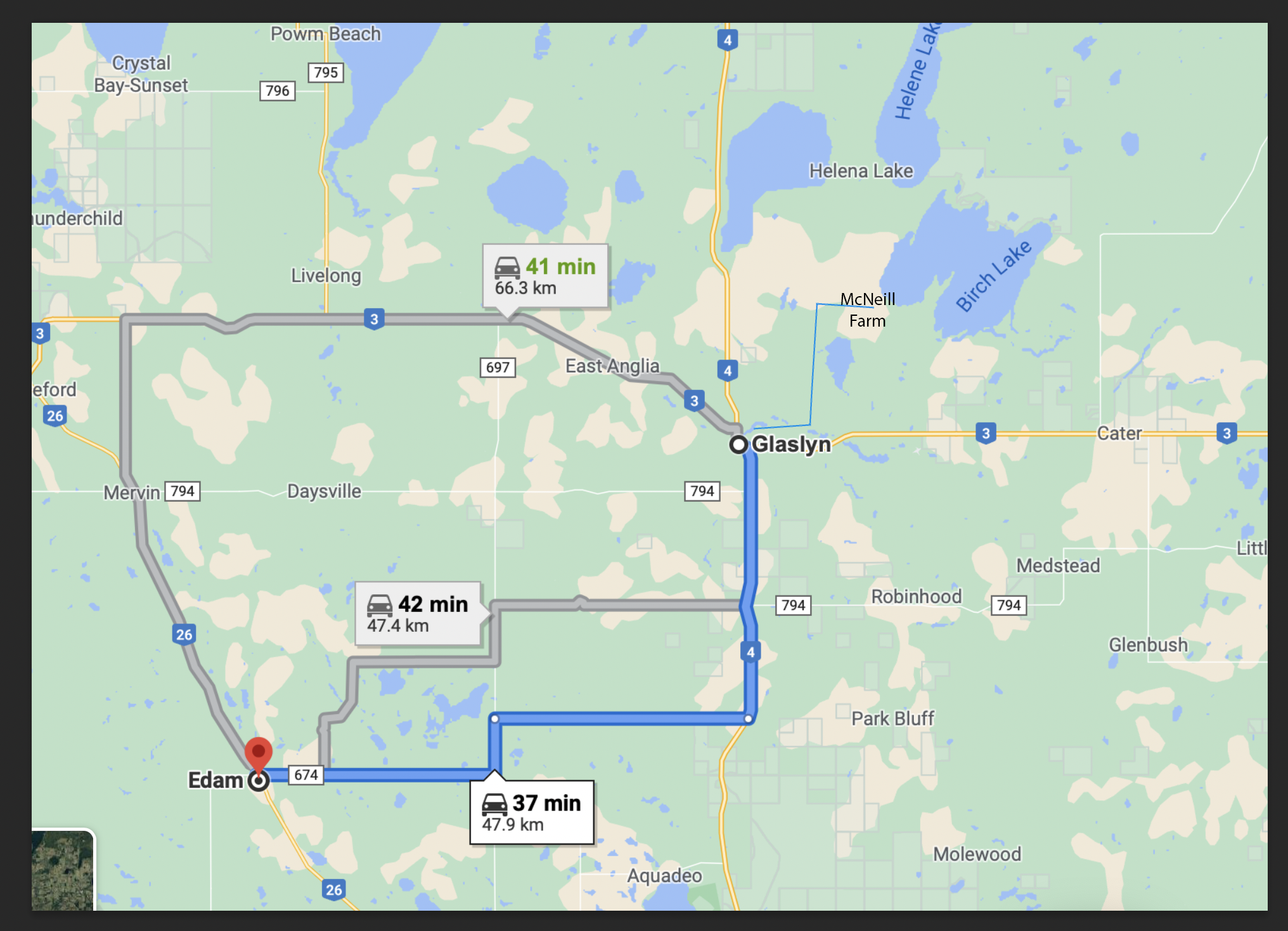
Map: It is not known exactly which route the McNeill’s travelled to
reach the hospital in Edam. All the roads in 1941 would have been far less
developed than today.
The high winds rolling off the southwest shore of Birch Lake, savagely pounded the log cabin even though it was partially sheltered by a thick Caragana hedge, and a small grove of Poplars. The wind treated these barriers as minor annoyances, as each time a gust hit, it felt as if their tiny home might be pushed from its foundation. The wind also created a forlorn howling sound as it whipped through the trees and around the house. Mixed with the fear of giving birth at home and alone, those sounds seemed the most lonesome in the world. What would she do if the baby could not wait?
While the temperature had remained steady near minus twenty in the early hours, by mid-morning, it had dropped, and was now nearing minus twenty-five. Over the past few winters, it was not uncommon to see the temperature drop to minus fifty or sixty during a cold snap. It was hard to tell the exact temperature, as their mercury thermometer would freeze at minus forty. Add to that, the wind chill, and exposed skin would freeze within seconds, and breathing that super cold air could damage your lungs in a few minutes.
Walking to a neighbouring farm would be a risky, perhaps deadly proposition. She knew of people who became lost in such storms, only to be later discovered frozen to death in a snowbank or in their stalled car. No, her best bet was to sit tight and wait for her husband. If the baby decided to come, she would just have to make do. It would be a January blizzard she would not soon forget.
Years later, when telling the story, Laura still shuddered at the memory:
Why on earth Dave would go out in such a storm to haul another load of logs when he knew the baby was due was beyond me? Then again, he was a man who just did those things, and while he was a loving person, he never let a little storm or a person – even a baby on the way – interfere with his plans.
He was a hard worker, and that morning, as usual, he had been up early to stoke the fire and put on the coffee pot. During these cold snaps, and particularly during a blizzard, he would get up several times at night to add a log to the fire; otherwise, everything in the house would freeze solid. Even with the warmth provided by the fire, a water pail by the door often had a layer of ice in the morning.
After the fire was roaring, Dave went to the barn to feed the stock, and harness the horses. The barn always seemed warm due to the heat generated from the animals, as well as the warm, rotting manure. Some farmers kept livestock in a separate part of the home in order to capture some of that heat. The musty, sweet smell of the cow and horse manure was quite pleasant to those who lived around and worked with livestock. To help our animals fend off these winter storm, Dave always fed them in the shelter of a barn, haystack, or grove of trees. When out of the biting, cold and wind, the cattle weathered these storms very well, but for the horses, Dad’s favourite animal, they were privileged. They had a cozy stall in the barn. Laura continued:
Dave was a horseman first, last, and always. He took great care of his horses, and, in return, expected them to work just as hard as he did. Every animal was expected to earn their keep no matter whether it was in the form of labour, beef, eggs, or bacon.
When he arrived back from the bard, breakfast was ready. Most mornings it consisted of crispy fried salted pork, along with milk gravy poured over homemade bread, a McNeill family favourite. When growing up, his sisters often teased him by calling him ‘Davie, Davie, bread, and gravy”. By seven-thirty, with the horses raring to go, Dave was off and running.
On his way out, I again reminded him the baby was due any day, and that I wanted to get to town, or to the hospital. He just smiled and told me in his usual calm, not to worry, that he’d be back about noon, and we would then head into Glaslyn. Tucked in his heavy winter parka and mitts, he disappeared into that howling blizzard.
From experience, Laura never knew whether Dave would return by noon or some time later. Late returns usually meant he had run into some buddies and the group decided to spend a little time socializing over a few swigs of moonshine. As the beverage of choice among the men, it was always in plentiful supply throughout the district. Laura expanded:
Dave and his friends had well-hidden ‘Stills’ they rotated around the district, so it was almost impossible for the RCMP (the Revenuers) to catch them. The little shacks were well hidden in the bush and the trails to the sites, easily concealed. Distilling liquor was a serious offence, but Dave and his buddies never seemed worried as they were always several steps ahead of the law. I suppose they also enjoyed the challenge of winning that little game, as much as having some cheap liquor. It was easy to hide, and it certainly wouldn’t freeze. No country dance was complete without a few ‘little brown jugs’ that kept everyone in high spirits.
Once Dave had left, all Laura could do was wait and hope he would return early and that the baby would decide to wait for another few hours or a day. Her fear of being alone when the baby came was well-founded, as being the third born in a family of ten; she understood the challenges of childbirth. Growing up, she had been old enough to be present and help when three of her younger siblings were born (2)(3). She recounted some of the challenges faced as her mother gave birth:
The older five kids, Leonard, Evelyn, Kenneth, Melvin and I, were born at Grandma’s home, in Southern Alberta near Sibbald. The last five at our homestead at Birch Lake. Mom (Lillie) was pregnant with Clifford when moving from Sibbald to Glaslyn by wagon train. When Clifford was born, he had a distinctive birthmark, about the size of a quarter on his forehead which her mom said was caused by the scare she had when Kenneth (age 4) almost fell out of the wagon when crossing a river.
The younger children were born at home with the help of a midwife, all that is, except for my youngest sister, Shirley. She was the only one born at home without my mom having the help of the midwife. Again, Laura reminisced:
My Mother desperately wanted to get to the hospital in Edam, but Shirley decided to come early, so mom never made it. More than being in the hospital for the birth, mom wanted to get a few days to rest from the endless work of looking after our large family. In those days, women were often kept in the hospital for a week or ten days, so that the rest would make things somewhat easier when they arrived home”. As with most large farm families, as the kids grew older they were soon pressed into service to help feed, clothe and shelter the family.
While Laura had been present, and even helped with the home birth of the youngest of her siblings – Marcia, Helen, and Shirley – what she now faced was utterly different. If her husband did not show up, she would be home alone. Over the years, Laura heard many stories of others who had died, or nearly died, while giving birth. She tried to set aside these dark thoughts, but it was not easy. When the pain subsided, she busied herself making lunch while hoping that Dave would show up as promised.
Just before noon, she heard the horses and sleigh pulling into the yard. She looked out and saw it piled high with logs. Dave had done another full day’s work by noon. As was his usual practice, he unhitched the horses, took them to the barn, and gave them a good feed of oats and hay before coming to the house to eat and warm himself. When he came in, mom told him the baby was on its way, and she needed to get to the hospital:
In his off-handed way, Dave said they could leave right after the horses had eaten and he had loaded the caboose. He told me it would take about an hour, but drifted roads would make it slow going. At that moment, the pain hit again, and I doubled over. It wasn’t until that moment Dave seemed to realize he’d better ‘shake a leg’, or he would be delivering the baby on his own.
Less than half an hour later, Dave, had the caboose loaded, a fire built in the wood heater and they were on the road to Glaslyn. In those days, travelling in a caboose, even in the middle of a heavy winter blizzard, was comfortable. The heater kept the caboose toasty warm 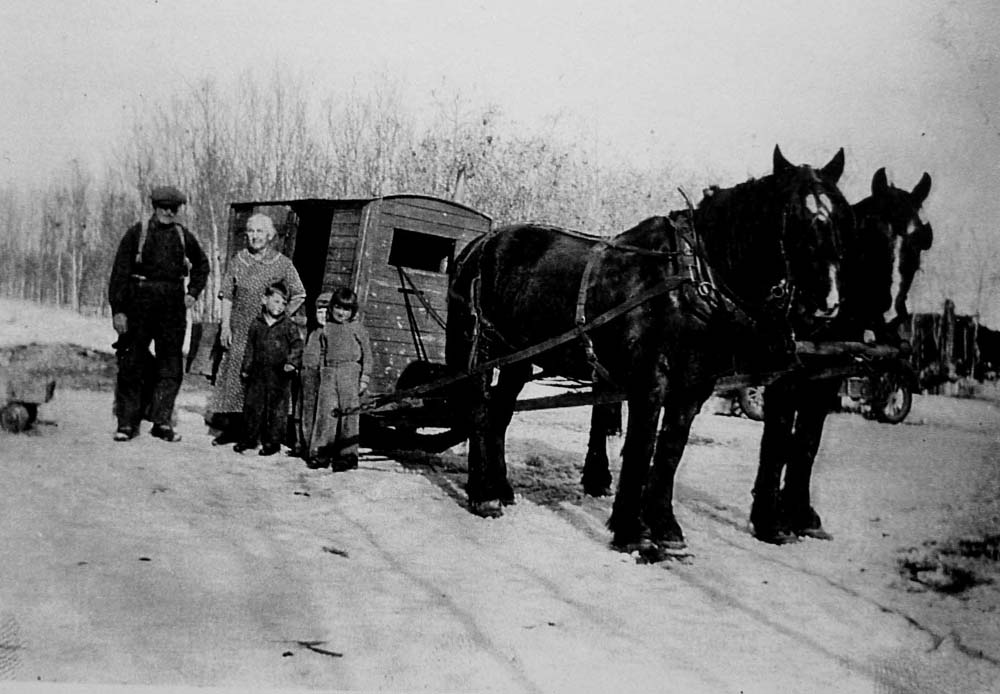 and there was always of a pot of hot coffee at hand. The caboose had a bunk, blankets, and table so everyone was comfortable.
and there was always of a pot of hot coffee at hand. The caboose had a bunk, blankets, and table so everyone was comfortable.
Caboose: In this photo Grandpa and Grandma stand beside their
caboose on a sleigh. We don’t know which children are standing with them but likely two of their grandchildren.
Often family and friends travelled together, as there was room for eight or ten. It was a great way to travel to and from a dance or party. The horses were always ‘sober’ and knew the roads so well they were just left to saunter along at their own pace (1). Whoever supplied the caboose was the last in line and would pick up or drop people off at their homes along the way. After the dance or party was over, the happy crowd climbed aboard and let the horses follow the return route. At the destination, they would just pull up and stop. After the horses were fed and, in the barn, we would sometimes just settle down in the caboose for the rest of the night.
Today, as they continued toward Glaslyn, Dave and Laura sat at the table drinking coffee and playing crib. But as soon as they hit the first snowbank, Dave had to get out and clear a partial path as the horses could not drag the sleigh through. To Laura’s great relief, she experienced no further pains, and even had time for a short nap.
About three-thirty, they reached Glaslyn and Dave drove straight away to the home of his best friend, just outside the town. Although the roads were terrible, he hoped they could make the rest of the trip to the hospital by car.
Dad put his horses in the barn, fed them, and, along with his friend, managed to get the old Ford started. By four-thirty, they were on the road for the thirty-five-mile trip. I think the route they took was the shorter direct route as seen on a map. Also, an X marks the location of their farm on the western edge of Birch Lake. In the 1990’s Lynn and I travelled around the area looking for old homestead sites. While we were able to find some ruins, we could not find anything near Mom and Dad’s first home was located on Birch Lake.
As they made their way to Edam, Laura was bundled up in blankets in the back seat, but at minus twenty-five, it was a far cry from the comfort of the caboose. Cars in those days only had rudimentary heaters and were not well sealed against the elements. In this car, a broken side window covered with some loose-fitting cardboard, didn’t stop much wind, so it was almost as cold inside as out.
Mom also worried that she would barely have room to move if she had a contraction in the back seat. While she feared having the baby at home alone, she now feared the baby would decide to come in the car. The thought of giving birth in the back seat in the middle of a raging blizzard was terrifying.
Ordinarily, the thirty-five-mile trip from Glaslyn to Edam might take an hour or so, but progress was painstakingly slow due to the current road and weather conditions. The two men often had to get out and shovel through the snowbanks, then take several runs to get through. To fend off the bitter cold, they had a couple of bottles of moonshine with which they liberally plied themselves.
After four hours of hard work and a half bottle of moonshine (it was strong stuff), they had barely travelled half the distance. It was dark, cold, and generally miserable. If they became stuck and unable to move, they would all be in serious trouble, as one of the men would have to leave to get help while the other stayed with Laura.
A few minutes after ten, while the men were again clearing a snowbank, Laura’s water broke, and the labour pains became more intense. While both men had, to this point at least, treated the trip as a bit of an adventure, they suddenly grasped the graveness of the situation – the baby might well decide to come before they reached the hospital. So, they put away the bottle, stopped chatting, and doubled their efforts to clear a path. They arrived at the hospital just before midnight. The nurses rushed Laura to the delivery room, and shortly after midnight on January 13th, 1941, Harold David McNeill, arrived.
Later that morning, the blizzard broke, temperatures moderated, and the skies cleared. After visiting with the new Mom and babe, the men returned home to look after their stock. A week later, dad returned to pick up his wife and baby, and took them back home to Birch Lake. Laura was happy as she would now have full-time company in her tiny log home.
Parksville, BC
May 2009
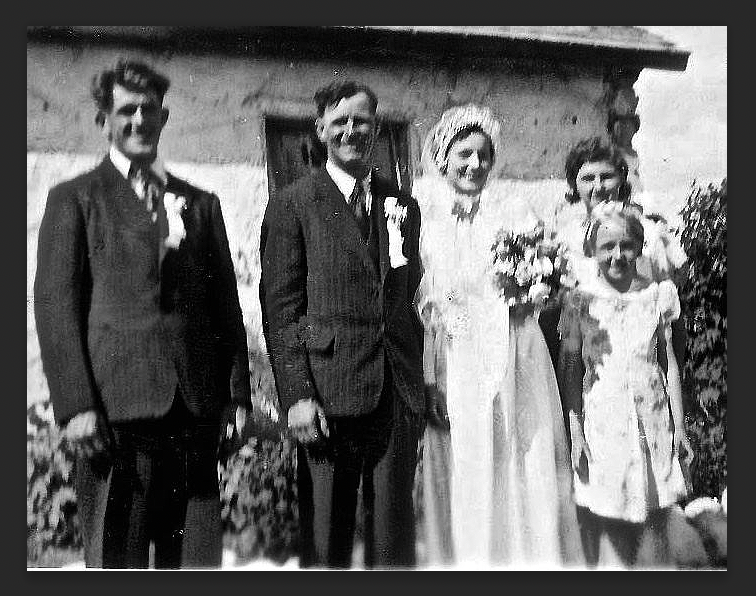
Photo: David Benjamin McNeill and Laura Isabel Wheeler
Wedding Day, Summer, 1940
Those photo appears to be taken outside Laura’s parents home.
Link to Next Post: A New Beginning
Back to Main Index
(1) While visiting Aunt Pat (dad’s youngest sister) in the Stoney Plain Hospital just outside of Edmonton in June 2010, she related the following story about dad’s horses finding their way home on their own:
“One particularly cold winter day while Laura was waiting for your Dad to come to their home she heard the sound of the horses arriving in the front yard. She looked out the window and the horses were just standing there hitched to the sleigh. After a few minutes, when Dave did come in, she put on her coat, went outside, but he was nowhere to be found.
She led the horses over to the barn, gave them some hay then went back to the house to wait. After a half-hour, she became more worried as she felt something might have happened to Dave. She knew he most often worked alone and it was dangerous work falling trees and loading logs.
After an hour Dave came stomping into the house. He was steaming mad and cursing his horses. After he got his coffee he told Laura what had happened. While driving he became cold sitting on the logs so he got off and started to walk behind to get warmed up. The horses continued to walk on their own lead but, suddenly, they began to trot and he could not catch up. He hollered “whoa” several times but they just kept going. He was furious. When Dave issued a command to his horses, he expected them to obey. Pretty soon they were out of the site and he ended up walking all the way home, about an hour by foot.
Laura then asked him if he was going to go out and take the harnesses off the horse and feed them but he just said: “To hell with them, let them freeze for awhile, that will teach them to leave me behind.”
A little later, feeling sorry for the horses, Laura went out to unhitch them and put them in the barn, a job she had never done before as neither her dad nor Dave had ever taught the girls these jobs. She managed to get them unhitched from the sleigh and into the barn but she had no idea how to get the harnesses off. She worked away undoing buckles and straps until she was finally able to pull the harnesses off over their behinds. She dragged them into a corner and left them laying in a heap.
Now she could not figure out how to get the sweaty collars off not knowing they were buckled at the bottom under a flap. When undone this allowed the collars to split in two. Not willing to give up, she finally decided to just pull them off over the horse’s heads. She stood on the stall railing and started pulling. As the collars were fairly tight, the horses must have wondered what in hell this crazy woman was doing. They probably had sore ears for a couple of days.”
I guess Dave never said another thing about the incident nor did he ask Laura why the many straps and hitches on the harness were undone, nor did he ask how she managed to get the collars off. I guess Dave was smart enough to know when to let sleeping dogs lie.
(2) Laura McNeill — siblings
1914 Leonard
1916 Evelyn
1918 Mom, (Laura Isabel Skarsen (McNeill)(Wheeler)
1920 Kenneth
1922 Melvin
1924 The family, Bill and Lillie and above children, left Alsask and travelled to Birch Lake. Lillie was in the late stage of her pregnancy with Clifford.
1924 Clifford
1928 Tonnie
1932 Marcia (Laura assisted in the birth of the last three)
1934 Helen
1938 Shirley
1940 Their father, Bill, passed away before Laura was married in the spring of 1940. The widow was, Lillie, was left with six children ranging in age from tw0 years to their late teens. The oldest brother Leonard drowned in 1938 while booming logs on the Shuswap in British Columbia.
(3) David McNeill – siblings
1893 Parents, James and Ellen married in Chamberlain, South Dakota
1910 Moved to Battleford from Chamberlain South Dakota
1911 To Birch Lake, SK
1894 – 1959 (Mac) James
1896 – 1974 Curtis (Clifford)
1898 Ruby
1901 – 1964 Irene
1902 – 1990 Hazel
1905 – 1985 Elizabeth
1908 – 1965 Dad, David the last of children born in the USA. They entered Canada in Manitoba and travelled to North Battleford by train. In North Battleford they took all their life belongings and headed to Birch Lake to build a new home on the quarter section of land they had been assigned to settle.
1910 – 1982 Armina (twin) following children born in Saskatchewan
1910 – 1990 Almira (twin)
1914 – 1976 Floyd
1916 – 2013 Patricia
A full list of grandparents, parents, and children is available by sending an email to Harold McNeill at lowerislandsoccer@shaw.ca
(3315)

